The Secret War Between Downloading and Uploading: Tales of the Computer as Culture Machine
暫譯: 下載與上傳之間的秘密戰爭:電腦作為文化機器的故事
Lunenfeld, Peter, Roettinger, Brian
- 出版商: Summit Valley Press
- 出版日期: 2011-04-22
- 售價: $700
- 貴賓價: 9.5 折 $665
- 語言: 英文
- 頁數: 219
- 裝訂: Hardcover - also called cloth, retail trade, or trade
- ISBN: 0262015471
- ISBN-13: 9780262015479
海外代購書籍(需單獨結帳)
商品描述
As we hurtle into the twenty-first century, will we be passive downloaders of content or active uploaders of meaning?
The computer, writes Peter Lunenfeld, is the twenty-first century's culture machine. It is a dream device, serving as the mode of production, the means of distribution, and the site of reception. We haven't quite achieved the flying cars and robot butlers of futurist fantasies, but we do have a machine that can function as a typewriter and a printing press, a paintbrush and a gallery, a piano and a radio, the mail as well as the mail carier. But, warns Lunenfeld, we should temper our celebration with caution; we are engaged in a secret war between downloading and uploading--between passive consumption and active creation--and the outcome will shape our collective futures.
In The Secret War Between Downloading and Uploading, Lunenfeld makes his case for using digital technologies to shift us from a consumption to a production model. He describes television as the "the high fructose corn syrup of the imagination" and worries that it can cause "cultural diabetes"; prescribes mindful downloading, meaningful uploading, and "info-triage" as cures; and offers tips for crafting "bespoke futures" in what he terms the era of "Web n.0" (interconnectivity to the nth power). He also offers a stand-alone genealogy of digital visionaries, distilling a history of the culture machine that runs from the Patriarchs (Vannevar Bush's WWII generation) to the Hustlers (Bill Gates and Steve Jobs) to the Searchers (Larry Page and Sergey Brin of Google fame). After half a century of television-conditioned consumption/downloading, Lunenfeld tells us, we now find ourselves with a vast new infrastructure for uploading. We simply need to find the will to make the best of it.
商品描述(中文翻譯)
隨著我們快速進入二十一世紀,我們將是被動的內容下載者,還是主動的意義上傳者?
彼得·盧嫩費爾德(Peter Lunenfeld)寫道,電腦是二十一世紀的文化機器。它是一個夢想裝置,作為生產模式、分配手段和接收場所。我們尚未實現未來主義幻想中的飛行汽車和機器人管家,但我們擁有一台可以作為打字機和印刷機、畫筆和畫廊、鋼琴和收音機、郵件以及郵件運送者的機器。然而,盧嫩費爾德警告我們,慶祝的同時應該保持謹慎;我們正參與一場下載與上傳之間的秘密戰爭——在被動消費與主動創造之間——其結果將塑造我們的共同未來。
在《下載與上傳之間的秘密戰爭》中,盧嫩費爾德主張使用數位技術將我們從消費模式轉向生產模式。他將電視描述為「想像力的高果糖玉米糖漿」,並擔心它可能導致「文化糖尿病」;他建議有意識的下載、有意義的上傳,以及「資訊分流」作為療法;並提供在他所稱的「Web n.0」時代(互聯互通的n次方)中打造「量身定制的未來」的技巧。他還提供了一個獨立的數位先驅家譜,提煉出從族長(范尼瓦·布什的二戰世代)到掙扎者(比爾·蓋茲和史蒂夫·喬布斯)再到探索者(谷歌的拉里·佩奇和謝爾蓋·布林)的文化機器歷史。在經歷了半個世紀的電視條件下的消費/下載後,盧嫩費爾德告訴我們,我們現在擁有一個龐大的上傳新基礎設施。我們只需找到意願,充分利用它。
作者簡介
Peter Lunenfeld is a Professor in the Design Media Arts Department at UCLA. He is the author of Snap to Grid: A User's Guide to Digital Arts, Media, and Cultures (2000, 2001) and User: InfoTechnoDemo (2005), both published by the MIT Press.
作者簡介(中文翻譯)
彼得·盧嫩費爾德(Peter Lunenfeld)是加州大學洛杉磯分校(UCLA)設計媒體藝術系的教授。他是《Snap to Grid: A User's Guide to Digital Arts, Media, and Cultures》(2000, 2001)和《User: InfoTechnoDemo》(2005)的作者,這兩本書均由麻省理工學院出版社(MIT Press)出版。



























